Related Research Articles

Fear is an intensely unpleasant emotion in response to perceiving or recognizing a danger or threat. Fear causes physiological changes that may produce behavioral reactions such as mounting an aggressive response or fleeing the threat. Fear in human beings may occur in response to a certain stimulus occurring in the present, or in anticipation or expectation of a future threat perceived as a risk to oneself. The fear response arises from the perception of danger leading to confrontation with or escape from/avoiding the threat, which in extreme cases of fear can be a freeze response.
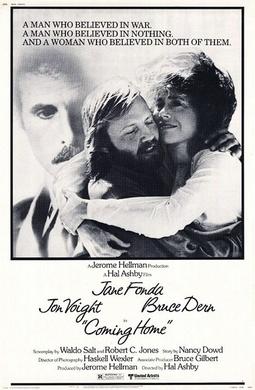
Coming Home is a 1978 American romantic war drama film directed by Hal Ashby from a screenplay written by Waldo Salt and Robert C. Jones with story by Nancy Dowd. It stars Jane Fonda, Jon Voight, Bruce Dern, Penelope Milford, Robert Carradine and Robert Ginty. The film's narrative follows a perplexed woman, her Marine husband and a paraplegic Vietnam War veteran with whom she develops a romantic relationship, while her husband is deployed in Vietnam.

Tim O'Brien is an American novelist who served as a soldier in the Vietnam War. Much of his writing is about wartime Vietnam, and his later work often explores the postwar lives of its veterans.

Barry Lee Levinson is an American film director, producer and screenwriter. His best-known works are mid-budget comedy drama and drama films such as Diner (1982), The Natural (1984), Good Morning, Vietnam (1987), Bugsy (1991), and Wag the Dog (1997). Levinson won the Academy Award for Best Director for Rain Man (1988). In 2021, he co-executive produced the Hulu miniseries Dopesick and directed the first two episodes.

Thunderpants is a 2002 family comedy film about a boy whose incredible capacity for flatulence gets him a job as an astronaut. The film was directed by Pete Hewitt, whose previous work included Bill & Ted's Bogus Journey (1991) and The Borrowers (1997). The script was written by Phil Hughes, based on a story by Pete Hewitt about a boy who dreams of being a spaceman, but has a problem with flatulence.

The Things They Carried (1990) is a collection of linked short stories by American novelist Tim O'Brien, about a platoon of American soldiers fighting on the ground in the Vietnam War. His third book about the war, it is based upon his experiences as a soldier in the 23rd Infantry Division.
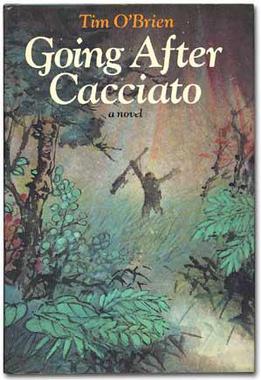
Going After Cacciato is an anti-war novel written by Tim O'Brien and first published by Delacorte Press in 1978. It won the U.S. National Book Award for Fiction. O'Brien himself says that "Going After Cacciato is a war novel. However, this is a controversial idea due to the fact that the book is about a soldier going AWOL."

Jeffrey is a 1995 American romantic comedy film directed by Christopher Ashley, based on the play of the same name by Paul Rudnick, who also wrote the screenplay adaptation. The film stars Steven Weber, Michael T. Weiss, Patrick Stewart, and Bryan Batt.
Systematic desensitization, or graduated exposure therapy, is a behavior therapy developed by the psychiatrist Joseph Wolpe. It is used when a phobia or anxiety disorder is maintained by classical conditioning. It shares the same elements of both cognitive-behavioral therapy and applied behavior analysis. When used in applied behavior analysis, it is based on radical behaviorism as it incorporates counterconditioning principles. These include meditation and breathing. From the cognitive psychology perspective, cognitions and feelings precede behavior, so it initially uses cognitive restructuring.

Asterix and the Normans is the ninth book in the Asterix comic book series, written by René Goscinny and drawn by Albert Uderzo. It was first published in serial form in Pilote magazine, issues 340–361, in 1966. It depicts a meeting between Asterix's Gaulish village and a ship full of Normans (Vikings).
In the Lake of the Woods (1994) is a novel by the American author Tim O'Brien. In the Lake of the Woods follows the struggle of Vietnam veteran John Wade trying to deal with a recently failed campaign for the United States Senate. After moving to Lake of the Woods County, Minnesota, John discovers one morning that his wife, Kathy, is missing. Through flashbacks to John's childhood, college years, and war experiences, as well as testimony and evidence from affected characters, the novel provides several hypotheses for Kathy's disappearance, without resolving the question.

Call It Courage is a 1940 children's novel written and illustrated by American author Armstrong Sperry. The novel won the Newbery Medal for excellence in American children's literature in 1941.

Midnight is a novel by American writer Dean Koontz. It was published in 1989. The book is a cross-genre novel. It includes aspects of suspense, science fiction, love story, and horror.
Exposure therapy is a technique in behavior therapy to treat anxiety disorders. Exposure therapy involves exposing the target patient to the anxiety source or its context without the intention to cause any danger (desensitization). Doing so is thought to help them overcome their anxiety or distress. Procedurally, it is similar to the fear extinction paradigm developed for studying laboratory rodents. Numerous studies have demonstrated its effectiveness in the treatment of disorders such as generalized anxiety disorder, social anxiety disorder, obsessive-compulsive disorder, post-traumatic stress disorder (PTSD), and specific phobias.
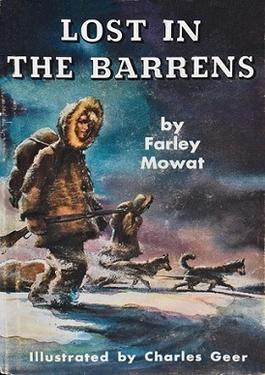
Lost in the Barrens is a 1956 children's novel by Farley Mowat. Later editions used the title Two Against the North.
"The Tower" is the fourteenth episode of the third season of the American fantasy drama series Once Upon a Time, and the show's 58th episode overall, which aired on March 23, 2014.
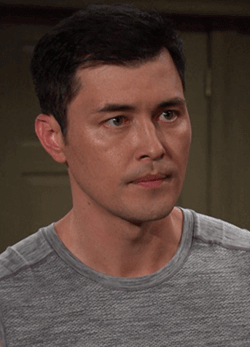
Paul Narita is a fictional character from Days of Our Lives, an American soap opera.

The Law vs. Billy the Kid is a 1954 American western film directed by William Castle and starring Scott Brady, Betta St. John and Paul Cavanagh. It was produced by Sam Katzman for distribution by Columbia Pictures.
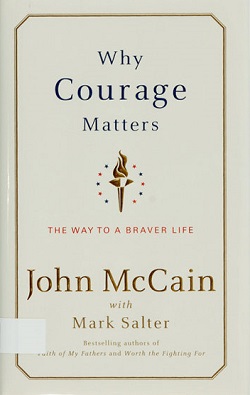
Why Courage Matters: The Way to a Braver Life is a 2004 book by United States Senator John McCain with his frequent collaborator and aide Mark Salter. Published by Random House, it is mostly mini-biographies and mini-commentaries on others, but contains a small autobiographical element.
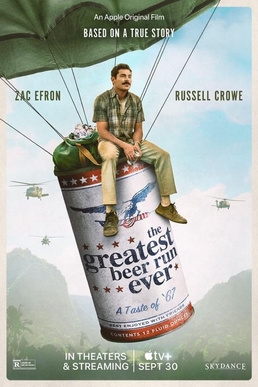
The Greatest Beer Run Ever is a 2022 American biographical war comedy-drama film directed and co-written by Peter Farrelly, based on the book of the same name by John "Chickie" Donohue and Joanna Molloy. The film stars Zac Efron and Russell Crowe, and follows the true story of Donohue, who as a young veteran sneaks into the Vietnam War to deliver some beer to his friends, who are serving their duty.
References
- ↑ Gale, Cengage Learning A Study Guide for Tim O'Brien's "Where Have you Gone, Charming Billy?"